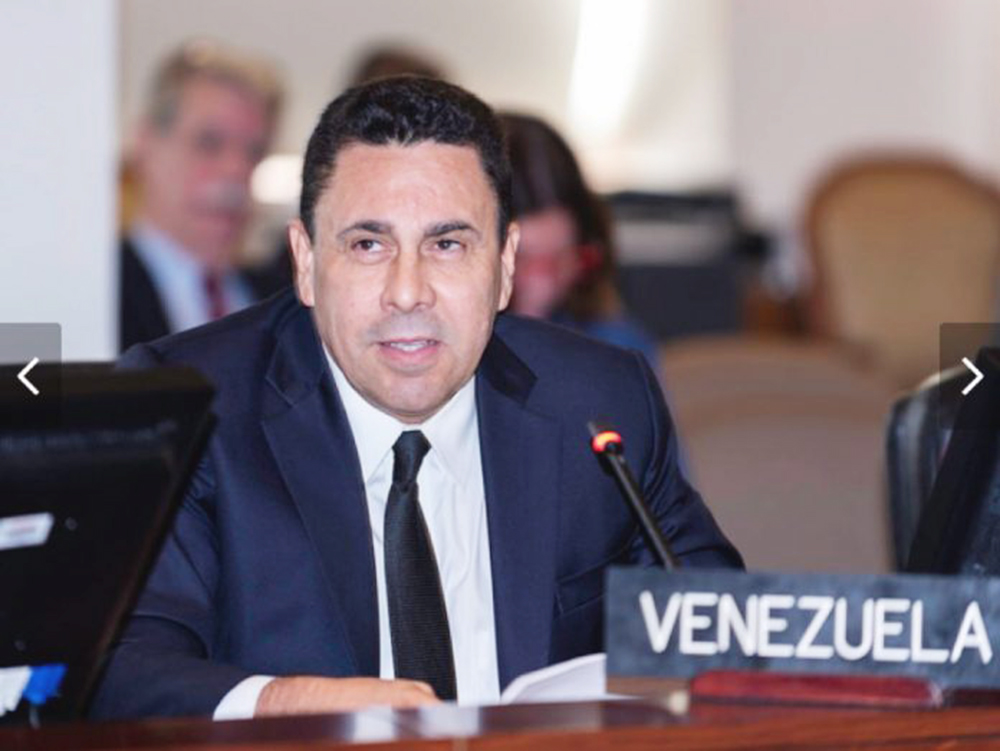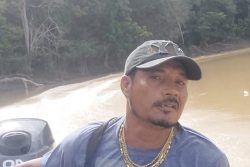While stating that Guyana would remain its “eternal neighbour” and therefore “brotherly relations of friendship and cooperation,” must be maintained, Vene-zuela in the same vein is calling for the World Court to dismiss Georgetown’s application for validation of the 1899 Arbitral Award setting the boundaries between the two countries.
Restating its position that the award is the product of fraud perpetuated by the United Kingdom—Guyana’s former imperial power—Venezuela’s contention is that Guyana has “benefitted from this injustice,” and that the only “victim” is Venezuela.
Those were among the sentiments expressed by Venezuela’s Agent, Samuel Moncada in closing remarks on behalf of his country yesterday before the Inter-national Court of Justice (ICJ) (World Court) in the Hague, the Netherlands.

The Court is currently hearing preliminary objections by Venezuela to Guyana’s case seeking a ruling that the 1899 arbitration ruling delineating the boundary between the two countries is valid and binding.
“We were deceived in 1899, but today we know the truth. It is impossible to deceive us once again” he told the Court.
Caracas’ position is that because of the fraudulent conduct which it alleges the United Kingdom (UK) committed in the arbitration of 1899 by which disputed territory was awarded to Guyana, it is invalid.
Opening the second round of arguments yesterday morning was Professor Christian Tams, who, on behalf of Vene-zuela’s legal team reiterated the UK being an indispensable party to the proceedings and not Guyana which it is argued has no standing to have brought the application before the Court in the first place.
He said that if Guyana is right, the Court, despite Venezuela’s fraud challenge will be upholding the award and conversely— if Venezuela is right—the award will be invalid and the United Kingdom will be found to have committed a breach of international law.
Tams said that nothing has been heard from Guyana on the potential breach of international law; while inquiring, in light of Venezuela’s fraud challenge, “how can Guyana plausibly pretend that the United Kingdom `has no legal interest in the validity of the award?’“
He said that the United Kingdom “is at risk of being found to have acted fraudulently,” and therefore to say that the UK has “no skin in the game is absurd.”
Guyana in its presentation to the Court last Friday dismissed Venezuela’s preliminary objections as incoherent, legally misconceived and factually baseless; arguing among other things that “the United King-dom has no legal interest, no legal rights or obligations,” which would be affected by a judgment of the Court on the merits of the case.
Tams, however, says that following from the first round of arguments last week, one detail that became clear is that the Court is being called upon to rule on the United Kingdom’s conduct, “with all the consequences such a ruling will entail.”
“How then can one escape the obvious conclusion that the United Kingdom is an indispensable party?” Tams asked.
Paul Reichler of the Bars of the United States Supreme Court and the District of Columbia, said on behalf of Guyana last week that Venezuela has been unable to identify any British interest which would be affected by the Court’s judgment on the validity of the 1899 award, noting that any interest it would have had regarding the boundary dispute, ceased after its former colony—Guyana—would have gained independence in 1966.
He stressed that thereafter, the United Kingdom “did not have and could not have” any legal interest, any legal rights or obligations in Guyana’s sovereign territory or in the international boundaries that define it.
On this point he then went on to assert that the United Kingdom can therefore not be considered as being an indispensable party to the proceedings before the Court and does not have to be added as is being advanced by Venezuela.
He stressed that contrary to Venezuela’s arguments, the UK is not an indispensable party to the proceedings.
Tams, however, submits that the UK is not a mere third State or in the background, declaring; “for the purposes of the parties’ claims, centred on the validity of the 1899 award, and on arbitration fraud, the United Kingdom is the other State. The only other State.”
For his part, Professor Paolo Palchetti in support of Tams on the Venezuelan team argued that while Guyana advances that the UK has no interest in the case, it remains “strangely silent” on the question of UK’s international responsibility and the obligations that arise from such responsibility.
Memorial
Palchetti said that Guyana had itself raised in its memorial the question of “deceit, corruption and coercion” and that Venezuela has done nothing more than highlight the consequences that result from such acts, to establish that a treaty or an award is null on such grounds; and requires first establishing that the United Kingdom is held liable for fraudulent conduct.
Against this background he said that if it is established that the UK has engaged in fraudulent conduct, then its international responsibility would be engaged and she would have the obligation to grant appropriate reparation.
Palchetti then next examined the UK’s consent to the World Court exercising its jurisdiction to finally settling the controversy in which it (the UK) has long said it will take no part in, having relinquished ties with its former colony—Guyana.
On this point Palchetti said that Article 4 of the 1966 Geneva Agreement where the UK consents has no basis in the text of the provision and the Guyana’s reliance thereon is misplaced.
That Article he said, makes no reference to the consent of, or more generally to the position of the UK in relation to the proceedings envisioned by that provision. According to him, the objective and purpose of Article 4 was to resolve the border controversy through practical arrangements that are acceptable to all the parties.
“It is not tenable therefore to establish any kind of link between Article 4 and the UK’s consent to the proceedings before the Court,” Palchetti said.
Meanwhile, in his address, Professor Andreas Zimmermann, noting Guyana’s calls for the Court to dismiss Venezuela’s preliminary objections as being inadmissible as it questions the Court’s jurisdiction on which it has already ruled and is now res judicata, said that the absence of the indispensable third party—the United Kingdom—restricts the Court’s ability to exercising jurisdiction conferred upon it by the parties and thus constitutes an admissibility issue and not a jurisdictional one.
Zimmermann who also represents Venezuela said that their objections could not be raised earlier as is contended by Guyana.
According to him, it was only following the Court’s December 18th, 2020 judgment giving itself jurisdiction that the question of the UK’s conduct and its responsibility under international law arose and which now “lies at the very heart of this case.”
Zimmermann said that the case as was framed by Guyana initially had not triggered the necessity of Great Britain being a party, but was rather Guyana’s complaints of its territorial integrity, Venezuela’s withdrawal from certain territory it alleges it occupies and the alleged illegal threat or use of force by Venezuela against Guyana.
On this point Zimmermann said that the 2020 judgment’s res judicata effect does not bar the Court from considering Venezuela’s preliminary objections.
Guyana’s position is that the issue of jurisdiction having already been decided upon is res judicata and that Venezuela, in no form or fashion can seek to re-litigate that issue.
Submitting as being without legal foundation Venezuela’s argument that the United Kingdom is an indispensable party, Professor Pierre d’Argent advanced on behalf of Guyana last week that in the Geneva Agreement of 1966, the UK as a party thereto had itself consented to that provision which allows the ICJ to be the forum before which the controversy is finally settled.
In his closing address, agent Moncada said that the situation which has arisen is one of Guyana repeating the claims of the British Crown’s claims as to the validity of the arbitration consummated in 1899.
But Guyana is not Britain, and did not even exist and yet 123 years later, “it is trying to justify this fraud,” Moncada said; while adding, “It is a sad state of affairs that a country proud of its independence should seek to take advantage of the fraud committed by its former metropolis against a fully independent and sovereign Republic.”
He then went on, “however, it is never too late for the truth,” stating that Guyana has “benefitted from this injustice,” and, “in this story there is only one victim—Venezuela.”
He continued, “But we extend a helping hand to Guyana. The existence of Guyana and Venezuela is everlasting. We would be eternal neighbours and we must maintain brotherly relations of friendship and cooperation.”
“Let us not allow the consequences of the unlawful conduct of the United Kingdom…to continue to affect the future of our nations.”
Moncada said that the 19th century was dominated by the plunder of gold and natural wealth at the hands of the United Kingdom imperial mining, and now, in the 21st century, oil transnationals seek to dominate the sovereign right of States over their natural resources and to stir “artificial divisions” that undermine relations between peoples for generations.
“Venezuela has always had a policy based on peace, honour and respect for International law, the Agent said, before going on to add, “We would never claim, or even aspire to something that does not belong to us.”
He then credited the Court as having what he said is a “unique opportunity to prevent the perpetuation of a fraud and to pave the way to reach, through direct talks, satisfactory solutions for the practical settlement of the controversy as is provided for in the 1966 Geneva Agreement.”
This round of hearings will conclude this morning when Guyana will respond and present its closing remarks on the objections raised by Caracas.
Presenting her country’s arguments on Thursday last, Venezuela’s Executive Vice President Delcy Rodriguez said that Caracas was not disputing the Court’s jurisdiction to adjudicate the matter, but rather with the fact that the claim had been brought by Georgetown which it argued is not the proper party to so do. Rodriguez presented Venezuela as being the “sole indisputable inheritor” of the territory in question.
Background
When Guyana gained independence, Venezuela occupied this country’s half of the island of Ankoko and routinely tried to dissuade investors from entering deals in the county of Essequibo. There have also been sporadic incursions by Venezuela’s military into Guyana and violations of this country’s airspace. In addition, vessels operating in Guyana’s waters off of Essequibo have been intercepted and detained by the Venezuelan navy.
After decades of futile talks with Venezuela over the controversy that arose over the 1899 arbitral award, Guyana decided in 2018 to approach the ICJ for a validation of the award and its binding nature on Caracas. After initially shunning the process, Caracas is now participating and is contending Guyana’s case is not admissible before the ICJ.
Back in March of this year, Guyana submitted its Memorial on the merits of its case. Three months later, Venezuela filed preliminary objections to the admissibility of Guyana’s case before the Court.








